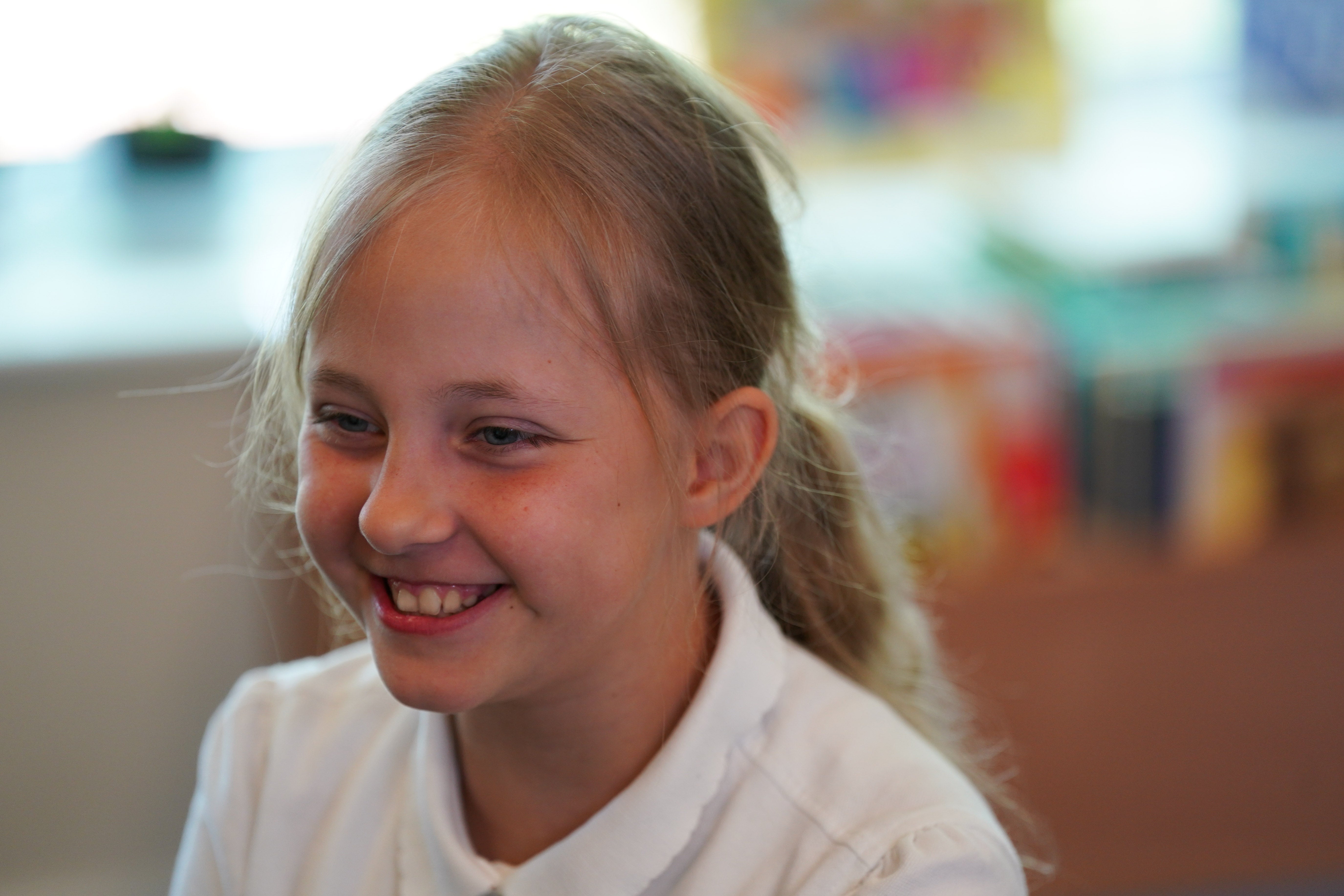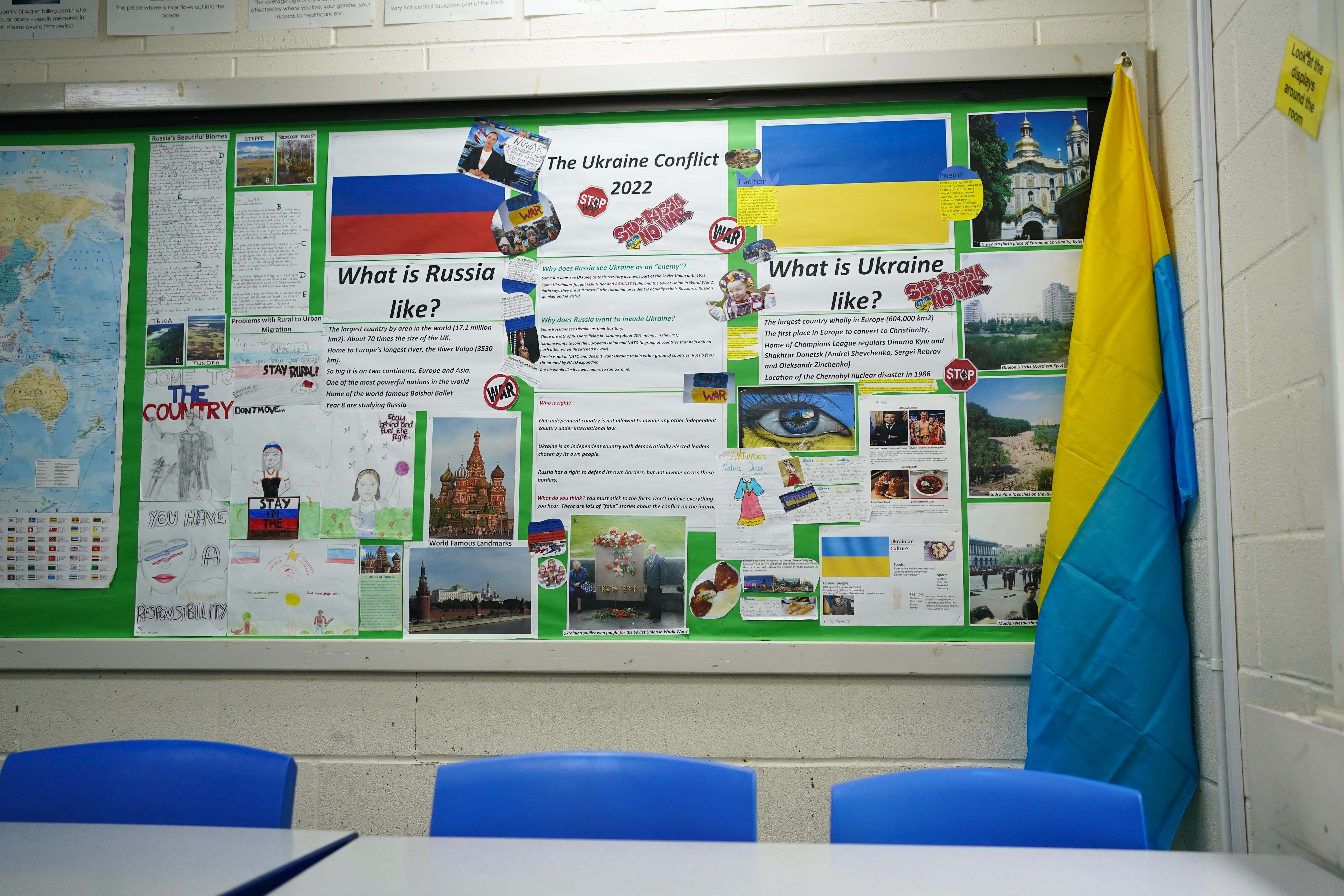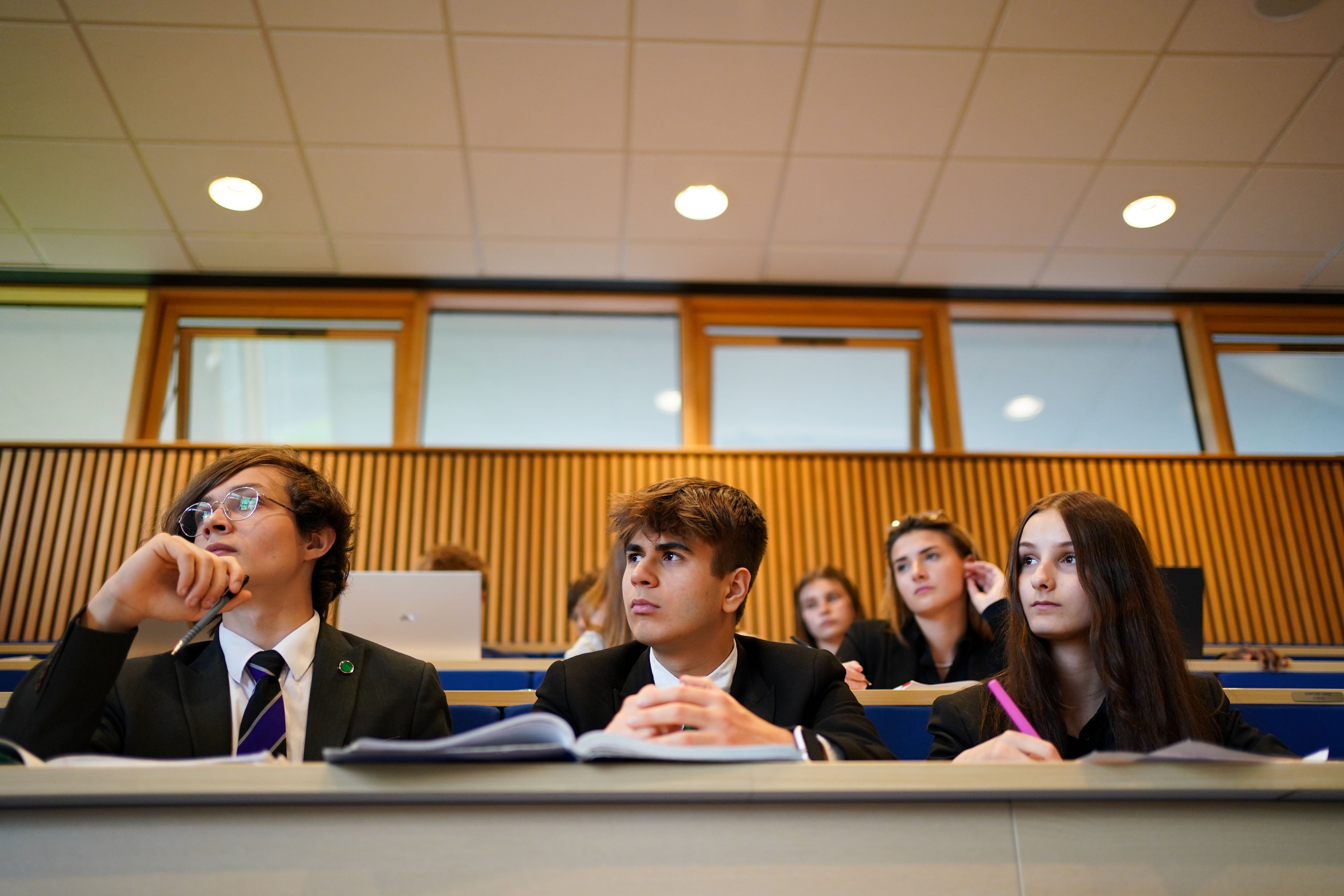
Ukrainian pupils have arrived just in time to celebrate the Queen’s Platinum Jubilee, with portraits of the monarch to be painted and tea parties planned for this week.
Tom Ormston, Year 5 and 6 teacher at Glapthorn CE Primary School in Northamptonshire, says the celebrations may have made it a “weird” time to join an English school.
The village primary school, near the town of Oundle – home to one of the country’s largest boarding schools – has recently welcomed a Ukrainian pupil, Sofi, into its mixed Year 5 and 6 class.
It’s been a really weird time to join an English school - so we’ve done loads of maypole dancing
The school is currently festooned with celebratory bunting and will be holding a tea party on Friday where pupils will be singing the national anthem and songs about the Queen.
“It’s been a really weird time to join an English school – so we’ve done loads of maypole dancing getting ready for that,” he says.
“To arrive in a school in a foreign country, where everyone dances round the maypole and then draws pictures of the Queen … it must be a very trippy experience. I hope I know the Ukrainian for ‘it’s not always like this’.”
The school is largely unused to adapting lessons for pupils without English – the last pupil they had with limited English was five or six years ago but pupils have been eager to welcome Sofi to their class.
They were even sensitive to the idea that arriving to classrooms bedecked in red, white and blue – incidentally the colours of the Russian flag – might feel intimidating.
Sylvia, a Year 5 “buddy” for Sofi, spotted that this could make her new classmate fearful.
The children, Mr Ormston says, have been “buzzing” to meet Sofi, with preparations including an afternoon before her arrival spent with Google Translate, applying sticky labels to everything from laptop trolleys to fire alarms in Ukrainian.
The pupils have added phonetic spellings of staff members’ names on a board in the Ukrainian alphabet, while Sofi is assisted by her buddy in her lessons, along with her laptop with Google Translate and her phone.
Mr Ormston says it has been like welcoming a “celebrity”.
“We had a conversation after that (afternoon of labelling) about okay, so clearly we’re very excited, how do we find the balance between ‘welcoming’ and ‘overwhelming’,” he says.
Sofi’s understanding has also been helped through a teaching assistant for a Year 6 pupil in the class who is deaf – both Universal Sign Language and picture cards are helping her to learn as she listens.
The class have even tried to pick up some Ukrainian to help her, although as Sylvia says: “We couldn’t really learn that much on Duolingo, because it would just be like, ‘Where is the honey?’”
As she and her buddy giggle away at their teacher’s artwork to explain the five senses, Sofi seems settled and happy after little more than a week.

As of 16 May, 53,800 Ukrainians had arrived in the UK through the Family Scheme, and many young pupils will now be joining British schools. In North Northamptonshire, where the school is based, 64 applications had been received and 45 school places offered as of this week.
Of course, alongside being displaced, adjusting to life in a new country and learning in a new language, there are clear differences between the two schooling systems, as well as the grievance of teenagers everywhere – uniform.
For Veronica, joining Year 8 at Prince William School in Oundle, this has been strangest of all.
Not only did she have to hide her nose piercing, she says emphatically that the uniform “was very strange for me”.
“Why purple?” she says, eyeing her vibrant blazer.
Veronica is also being supported in lessons by her buddy, Evie, and she uses an iPad repurposed from the Government scheme during the pandemic to help her.
The school staff are due to start English as an Additional Language training next term, while currently Veronica is using resources translated into Ukrainian from the website Twinkl in lessons.
She is following a full timetable, and the school is keen for her to learn as much as possible through immersion, rather than being withdrawn for additional English classes.
Head of Year 8 Sarah Love says that alongside two other Ukrainian pupils in Year 7, “we’re trying to keep students in lessons, try and keep sort of a normal way of working for them, it’s about integrating them and them feeling a part of the school community”.
Geography teacher David Sage, who is Evie’s father, has also had students produce a display on Ukraine to celebrate the country’s culture. He taught English as a foreign language in Ukraine 20 years ago, but acknowledges his Ukrainian is rather rusty.
He teaches a unit on Russia for Year 8 and adds that “we’ve had to be very careful about the content, obviously” but that the focus of the display has been on showing support.

For Veronica, not all differences between the Ukrainian and British school systems are bad. The purple uniform aside, she tells Ms Love that “in English, we discuss topics such as racism, homelessness, Ukrainian school we don’t talk about such topics – I’ve also noticed here at school they treat LGBT people quite well”.
And, having visited Cambridge with her host family, the Turners, she says that she likes England because it is “very beautiful”.
A particularly touching moment, Ms Love adds, was a surprise visit from Ann-Mary, a Ukrainian student at Oundle who was boarding at the school prior to the start of the conflict.
“She (Ann-Mary) started speaking Ukrainian and it was a big surprise, the smile on your (Veronica’s) face was beautiful,” she says.
Ann-Mary volunteers at Prince William School supporting Veronica, and Oundle School is also looking to provide a free day place for a Ukrainian student from September.
Headteacher Sarah Kerr-Dineen adds that it has been hard for international boarders with family in Ukraine who were at school in the UK when the conflict broke out.
“Being a long way from home when home has been destroyed is very, very hard,” she says.
“And I think some of them wouldn’t have known where their family exactly was at any stage and communications might have been difficult from time to time.
“I think what we’ve learned is that the divisions between Ukraine and Russia aren’t necessarily completely clear, and you have Russian families with Ukrainian heritage and Ukrainian families who’ve got families in Russia.
“Our role was also to support the Russian children in our care as well, and to make sure that within our school we didn’t have the same kind of tensions that were happening on the global scale, because the children didn’t start the war.”
For Ukrainian boarders at Wrekin College, a private boarding school in Wellington, they have also had to adjust to the change in schooling systems while fearing for their families’ safety abroad. Two boarders, George and Maryan, were already at the school last year on free places, while Valeria has arrived more recently.

George, 16, says British education is more “constricted”, perhaps echoing Veronica’s concerns about uniform.
“The biggest hardship was actually getting settled in terms of the mentality of the people around, because this is an English private school, obviously, and I’m from Ukraine, and things are done very differently there,” he says, adding that he needed time to “get used to it, to the rules, to etiquette”.
But he adds, to the gratification of his teachers, that “teachers here actually want to explain something to you and they won’t give up until they do”.
“They don’t read from the book, they don’t [say], ‘Oh you don’t understand, well that’s your problem, go read a book again’.”
In Ukraine, George was already a talented programmer and had sold one of his video games. He says both he and Maryan have been inspired to go into cybersecurity, partly because of the brilliance of Ukrainian hackers, who “have been printing inappropriate messages on printers in the Kremlin” during the war.
There’s no sense in which any of them have appropriated what has happened in order to get a different ride here
Valeria won Ukraine’s Got Talent and would prefer a career in music, adding, “I’m so proud of our band, of our group in Eurovision – they won and it’s so good”.
It is fair to say that from uniforms and stricter rules, to portraits of the Queen, changing schools at this time has been a huge adjustment.
As Tim Firth, their headteacher, says: “These people are so impressive – they tend to spend most of the time putting us at our ease, and just handing their prep in, which is impressive, isn’t it?
“There’s no sense in which any of them have appropriated what has happened in order to get a different ride here.”
He describes them as willing to “get stuck in”, and perhaps, so far from home, the normality of a purple blazer is just what is needed.







